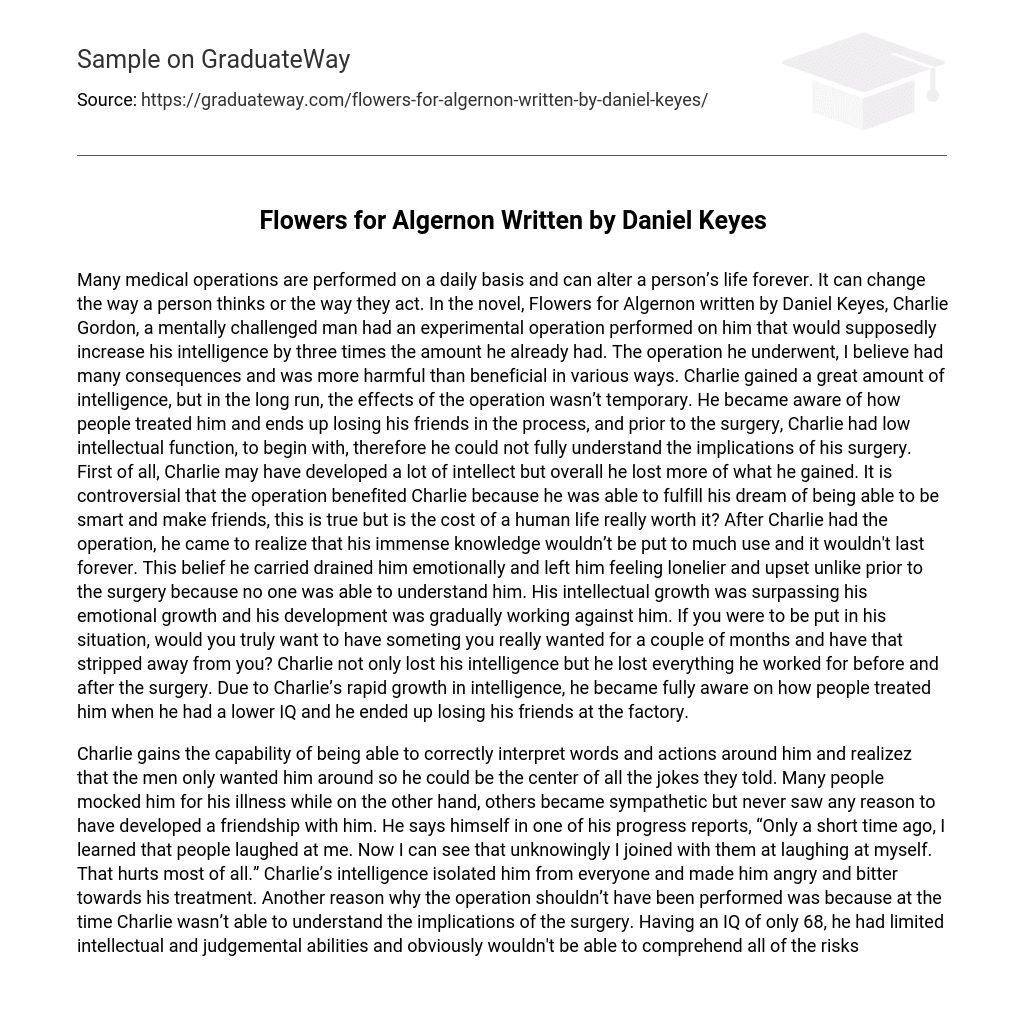Many medical operations are performed on a daily basis and can alter a person’s life forever. It can change the way a person thinks or the way they act. In the novel, Flowers for Algernon written by Daniel Keyes, Charlie Gordon, a mentally challenged man had an experimental operation performed on him that would supposedly increase his intelligence by three times the amount he already had. The operation he underwent, I believe had many consequences and was more harmful than beneficial in various ways. Charlie gained a great amount of intelligence, but in the long run, the effects of the operation wasn’t temporary. He became aware of how people treated him and ends up losing his friends in the process, and prior to the surgery, Charlie had low intellectual function, to begin with, therefore he could not fully understand the implications of his surgery. First of all, Charlie may have developed a lot of intellect but overall he lost more of what he gained. It is controversial that the operation benefited Charlie because he was able to fulfill his dream of being able to be smart and make friends, this is true but is the cost of a human life really worth it? After Charlie had the operation, he came to realize that his immense knowledge wouldn’t be put to much use and it wouldn’t last forever. This belief he carried drained him emotionally and left him feeling lonelier and upset unlike prior to the surgery because no one was able to understand him. His intellectual growth was surpassing his emotional growth and his development was gradually working against him. If you were to be put in his situation, would you truly want to have someting you really wanted for a couple of months and have that stripped away from you? Charlie not only lost his intelligence but he lost everything he worked for before and after the surgery. Due to Charlie’s rapid growth in intelligence, he became fully aware on how people treated him when he had a lower IQ and he ended up losing his friends at the factory.
Charlie gains the capability of being able to correctly interpret words and actions around him and realizez that the men only wanted him around so he could be the center of all the jokes they told. Many people mocked him for his illness while on the other hand, others became sympathetic but never saw any reason to have developed a friendship with him. He says himself in one of his progress reports, “Only a short time ago, I learned that people laughed at me. Now I can see that unknowingly I joined with them at laughing at myself. That hurts most of all.” Charlie’s intelligence isolated him from everyone and made him angry and bitter towards his treatment. Another reason why the operation shouldn’t have been performed was because at the time Charlie wasn’t able to understand the implications of the surgery. Having an IQ of only 68, he had limited intellectual and judgemental abilities and obviously wouldn’t be able to comprehend all of the risks and benefits associated with this important experimental procedure. Not to mention, it has only been performed on a non-human test subject which was Algernon (a mouse) Dr. Nemur and Strauss are at fault to even consider performing the operation on Charlie especially if they know it could end badly for him in the long run. There was nothing to let Charlie know that the excessive amount of knowledge he will be receiving could alter his life permanently.





